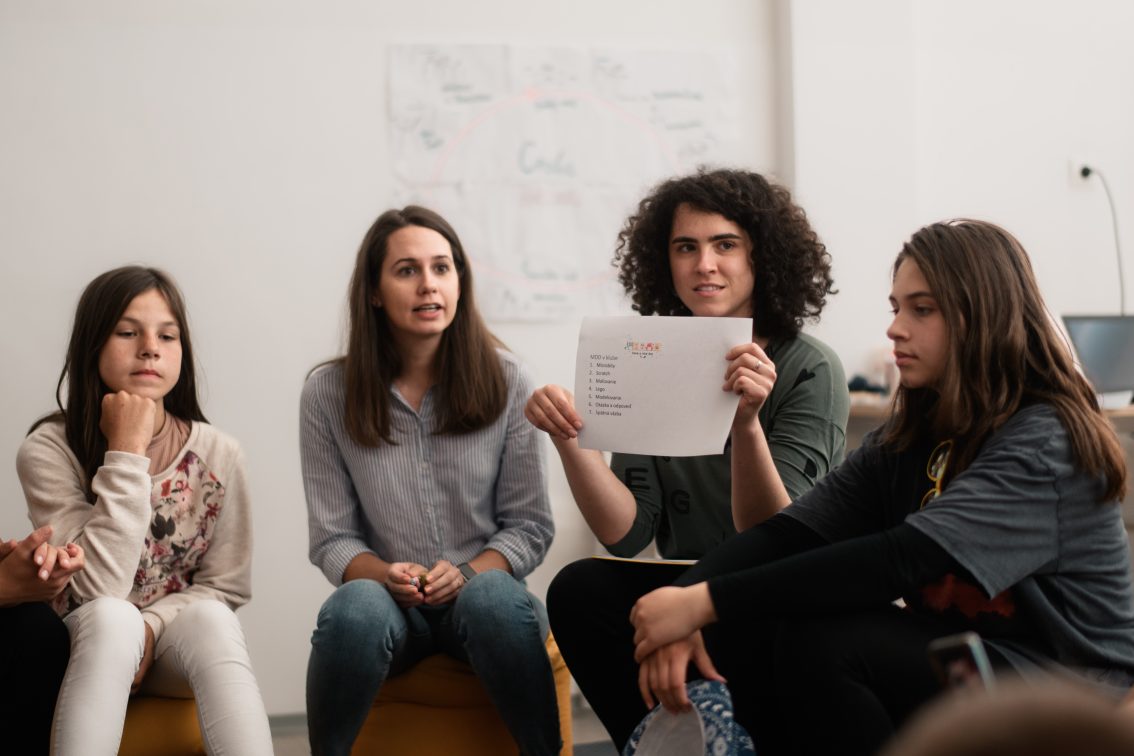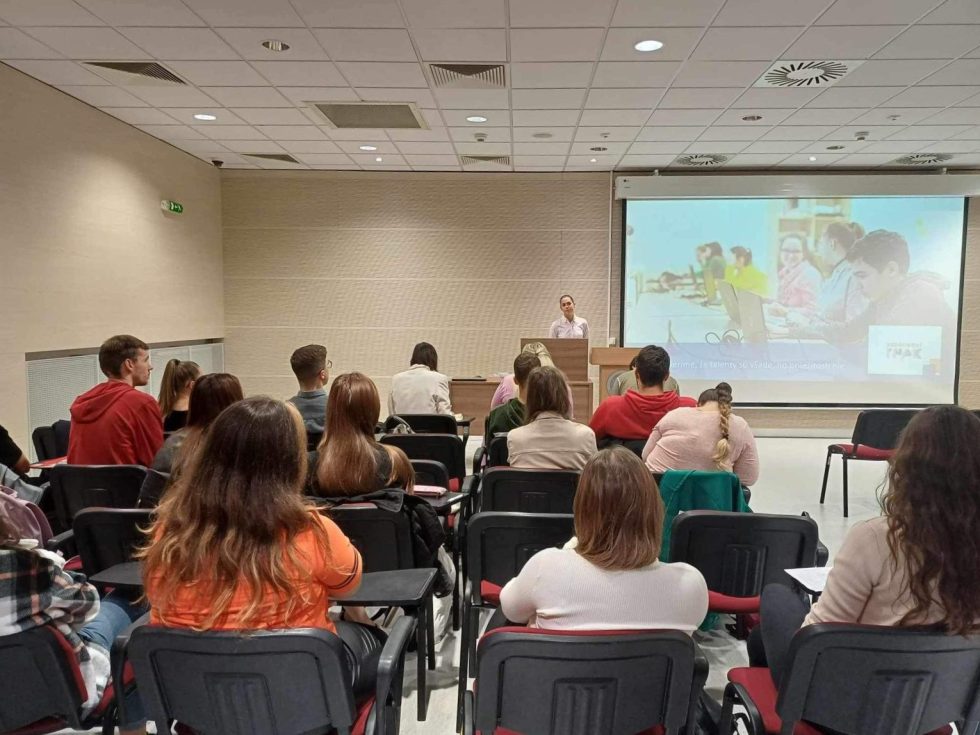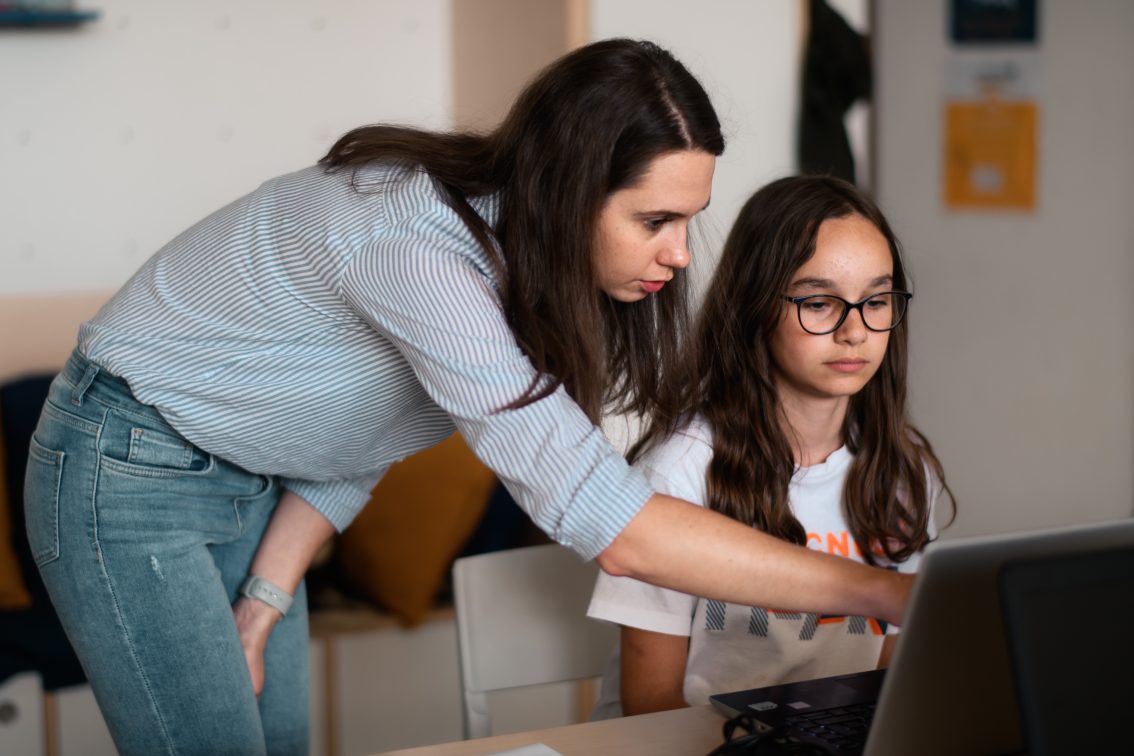Students are directly involved in the Open Future centers, transferring their knowledge into practice
Having completed student training, they decided to immerse fully in working with youngsters. Currently, four students who have undergone our informal education program are actively involved in Open Future, helping us work with children directly in our centers. How do we select them, how do they perceive the Open Future program, and what do they have to gain from this experience?
Over the four years of the program’s existence, a total of 21 students have come to participate in activities in three Open Future centers. In the clubs in Trnava, Zvolen, and Bratislava, they have taken on the roles of assistant coordinators—helping to organize trips, conducting educational activities with children to develop a feeling for entrepreneurship, soft or digital skills, and providing support.
“I have been involved in volunteering in various civic associations since the beginning of high school, but in recent years, there have been less opportunities. Therefore, I decided to make the most of my last year as a student. I realized that I could help myself and others,” says Veronika Antalová who worked at the center in the Fortuna municipal hostel in Bratislava about her motivation.
How suitable people are selected
Before students start working with children in the centers, they must complete the first phase of student training. This phase involves education on topics such as a respectful approach, group dynamics, inclusive and informal education. In the current winter semester, thirty university students participated in this phase.
“We observe students at these meetings, and already there, we identify those who seem suitable to us,” explains Miriam Šelepová, Senior Program Manager at Open Future. The possibility of continuing to the second phase is communicated by the program team on an ongoing basis, encouraging participants to consider it from the beginning.
This was the case for Aneta Chreňová, who worked in the center in Zvolen. “The main impulse for me was the presentation that the coordinator showed us during the recruitment at the faculty, especially the photos in it and others that I later looked at on the website. I liked what I saw in them, and I wanted to experience it, be part of something like this,” Aneta explains.
There are several prerequisites for acceptance into the second phase. “The type of motivation of students is crucial. It shouldn’t be only about getting pedagogical practice. The motivation should also come from a genuine interest in working with a group, being aware of the benefits they will gain, having a positive attitude towards this work, team spirit, and being active in the first phase of education. They need to have their tasks completed properly and give back feedback reports after every meeting,” says M. Šelepová. It is important to know if a student is willing to commit to the program. “We are primarily concerned with long-term and regular commitment, as children get used to the students, and it is challenging for them if someone leaves quickly or without stating a reason,” she adds. Therefore, students must participate for at least one semester.

What we aim to convey to students
Practical experience in the Open Future centers opens new opportunities for students. “Although the training in the first phase cannot be compared to traditional lectures in school, it’s still just theory. However, when I’m in the club with children and have to react promptly in various situations, motivate them to do activities, set boundaries… that’s a completely different way of learning. I get to know myself through this and have the opportunity to translate all the theoretical knowledge into practice,” evaluates Veronika.
Miriam Šelepová also confirms her words. Students in the clubs gain expertise in informal education and the opportunity to work with a closed group in a different way than they are used to in regular educational institutions. “They get the chance to be role models and positively influence young people in our centers, provide them with support, be their important adults, and contribute to a safe environment, which is crucial for children,” explains the program manager.
A significant benefit is also that students can take advantage of additional education, attend events, informal breakfasts, or bootcamps. At the same time, they have access to the curriculum, worksheets, and can work on developing their skills, which can be beneficial for their future careers.

However, working in the centers also brings some challenges. “Some students have experience with a different age group, often with children from pre-primary and primary education. It is interesting for them to work with older participants,” says M. Šelepová.
Another challenge is the informal nature of the Open Future program. “In the centers, our approach is collaborative, and sometimes it’s challenging to leave behind the old habits from school. However, eventually, everyone finds the informal nature of the activities in the center more enjoyable. We all go through a transformation in how we were taught things and how knowledge and skills can be transmitted differently,” she adds.
Learn more about the first phase of the program here.
We asked the students which activities were most interesting for them:
Aneta Chreňová: “As my favorite, I would choose the activity like storytelling, during which we wrote stories with the children from unfinished sentences. It was enjoyable for both me and the boys, since I was the only girl in the center that day. You could see they really got into it, completely immersed themselves, and came up with really cool creations. I had a prejudice that boys might not enjoy sitting down and writing. I was also a bit worried about how the activity would turn out, but once again, they proved me wrong.”
Veronika Antalová: “I like it when we do activities where the children have to collaborate. It’s interesting for me to observe how children, who might be quarrelsome and barely greet each other outside the club, suddenly overcome barriers and successfully complete a task when they have a common goal.”


